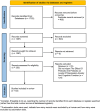The Effect of Prebiotics and Probiotics on Levels of Depression, Anxiety, and Cognitive Function: A Meta-Analysis of Randomized Clinical Trials
- PMID: 40038860
- PMCID: PMC11879892
- DOI: 10.1002/brb3.70401
The Effect of Prebiotics and Probiotics on Levels of Depression, Anxiety, and Cognitive Function: A Meta-Analysis of Randomized Clinical Trials
Abstract
Introduction: Recent studies have emphasized the relationship between mental health and the human intestine microbiota. In this study, we evaluate the effect of consuming Biotics, on levels of depression, anxiety, and cognitive function.
Methods: This meta-analysis adhered to the Preferred Reporting Items for Systematic Reviews and Meta-Analyses (PRISMA) standards. We searched MEDLINE (PubMed), Cochrane Library, Scopus, Web of Science, and ClinicalTrials.gov. All full-text articles and major reviews were manually searched for additional studies.
Results: The initial analysis was based on the concept that consuming Biotics causes changes in anxiety, measured using various instruments. This analysis showed that consuming Biotics significantly reduced anxiety in our study participants (SMD = 0.2894, Z = 2.46, P = 0.0139, I^2 = 92.4%). The meta-analysis included 4295 samples (2194 in the experimental group and 2101 in the control group). In terms of depression, the analysis showed that consuming Biotics significantly reduced depression in our study participants (SMD = 0.2942, Z = 2.13, P = 0.0335, I^2 = 91.7%). The meta-analysis included 3179 samples (1603 in the experimental group and 1576 in the control group). Regarding cognitive function, the analysis showed that consuming Biotics significantly improved cognitive function in our study participants (SMD = 0.4819, Z = 3.00, P = 0.0027, I^2 = 77.9%). The meta-analysis included 915 samples (470 in the experimental group and 445 in the control group).
Conclusions: Our results indicate that most recent studies support the effectiveness of probiotics in reducing symptoms of anxiety, depression, and cognitive issues despite some discrepancies in the findings. People with mild symptoms may experience greater benefits from taking probiotics.
Trial registration: PROSPERO registration ID: CRD42024589507.
Keywords: anxiety; cognitive function; depression; gut microflora; mental disorders; prebiotics; probiotics.
© 2025 The Author(s). Brain and Behavior published by Wiley Periodicals LLC.
Conflict of interest statement
The authors declare no conflicts of interest.
Figures







References
-
- Abildgaard, A. , Kern T., Pedersen O., Hansen T., Wegener G., and Lund S.. 2019. “The Antidepressant‐Like Effect of Probiotics and Their Faecal Abundance May Be Modulated by the Cohabiting Gut Microbiota in Rats.” European Neuropsychopharmacology 29, no. 1: 98–110. - PubMed
-
- Aizawa, E. , Tsuji H., Asahara T., et al. 2016. “Possible Association of Bifidobacterium and Lactobacillus in the Gut Microbiota of Patients With Major Depressive Disorder.” Journal of Affective Disorders 202: 254–257. - PubMed
-
- Akhgarjand, C. , Vahabi Z., Shab‐Bidar S., Etesam F., and Djafarian K.. 2022. “Effects of Probiotic Supplements on Cognition, Anxiety, and Physical Activity in Subjects With Mild and Moderate Alzheimer's Disease: A Randomized, Double‐Blind, and Placebo‐Controlled Study.” Frontiers in Aging Neuroscience 14: 1032494. - PMC - PubMed
Publication types
MeSH terms
Substances
LinkOut - more resources
Full Text Sources
Medical

